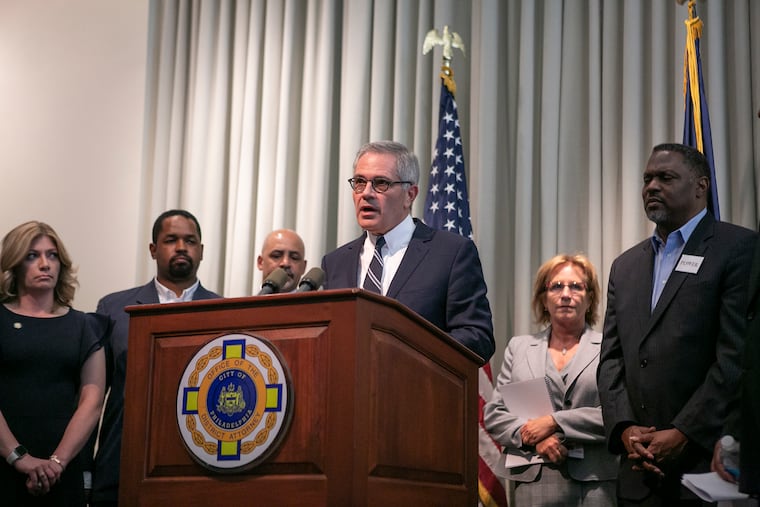DA Krasner wants Pa. Supreme Court to strike down state’s death penalty and declare it unconstitutional
Philadelphia District Attorney Larry Krasner said Tuesday that his office is asking the Pennsylvania Supreme Court to declare the death penalty unconstitutional because it is racially biased, is arbitrary, and discriminates against the poor.

Philadelphia District Attorney Larry Krasner said Tuesday that his office is asking the Pennsylvania Supreme Court to declare the death penalty unconstitutional because it is racially biased, is arbitrary, and discriminates against the poor.
Krasner said at a news conference crowded with reporters and attorneys that during a six-month study, supervisors in his Law Division reviewed every case in which a Philadelphia defendant was sentenced to death over 40 years ending in December 2017.
“The most jaw-dropping statistic is that out of 155 Philadelphia death sentences, 72 percent of them have been overturned,” said Krasner, a former criminal defense attorney who took office in 2018 and vowed that he would “never” seek the death penalty.
“What that means is that attorneys in this office, before we got here ... argued for the execution of other people and were wrong ... 72 percent of the time. And actually, it’s worse than that. Because those other 28 percent are not settled. You should expect that there will be even more of these that are overturned.”
Krasner, standing with anti-death-penalty state legislators, faith leaders, and his Law Division’s supervisors, spoke after his office filed a brief in response to a Philadelphia death-row inmate’s petition in a case that could have far-reaching ramifications.
The brief, filed Monday night with the state Supreme Court and signed by Krasner, asks the high court to invoke its King’s Bench power to address systemic problems in the state’s death penalty and to “hold that the death penalty, as it has been applied, violates the Pennsylvania Constitution’s ban on cruel punishments.”
The Philadelphia-based federal public defenders representing the inmate, Jermont Cox, who was convicted of three separate drug-related murders in 1992 and ordered to die for one of them, also represent Kevin Marinelli, a Northumberland County inmate sentenced to death for a 1994 killing.
In August, the federal defenders filed petitions for Cox and Marinelli, asking the high court to find the death penalty unconstitutional, citing a June 2018 bipartisan Joint State Government Commission report that found troubling deficiencies in the state’s death-penalty system. The attorneys asked the high court to invoke its King’s Bench authority.
In a February joint petition for Cox and Marinelli, Shawn Nolan, chief of the federal defenders’ Capital Habeas Unit, wrote: “Although the system was intended to apply only to the worst of the worst, arbitrary factors, such as geography, poverty, mental illness, and race, best predict who ends up on death row.”
Krasner’s office agrees with that assessment, and Monday night’s motion in the Cox case marks the first time Krasner has articulated its position to the state’s highest court.
An analysis by The Inquirer in May showed that Krasner has taken steps or signaled a willingness to overturn more than one-third of the death sentences for the then-45 Philadelphia convicted murderers on death row. In the remaining cases, the DA’s Office did not yet have to respond to sentencing appeals or its responses were pending.
The justices’ eventual decision on Cox and Marinelli could affect not just future death-penalty cases, but also the approximately 130 other inmates awaiting execution, potentially forcing the courts to resentence them.
Meanwhile, the Pennsylvania Attorney General’s Office responded for the commonwealth in Marinelli’s petition. Unlike Krasner’s position, the AG’s Office said the issue should be resolved in the legislature, not the courts.
“Because Marinelli raises policy questions that are in the legislative domain, not constitutional issues for the judiciary, review should be denied,” Hugh Burns Jr., senior appellate counsel in the AG’s Office, wrote in the brief also filed Monday night. Burns had previously served as chief of appeals in the Philadelphia DA’s Office.
In an emailed statement Tuesday, AG’s Office spokesperson Jacklin Rhoads said: “The important questions raised by the [Joint State Government Commission] report are legislative and should be thoroughly considered and resolved by Pennsylvania’s General Assembly — not through the judicial process. Our brief makes clear the Office of Attorney General’s position that policy decisions should remain the responsibility of the legislature, and that these issues should be a priority.”
The high court has set a Sept. 11 hearing date for oral arguments on the petition by Cox and Marinelli.
The latest Philadelphia inmate removed from death row was Laquaille Bryant, now 37, who had received two death sentences for the 2008 fatal shootings of a federally protected witness, Chante Wright, 23, and her friend Octavia Green, also 23. Bryant was resentenced to life in prison without parole by Common Pleas Court Judge Jeffrey Minehart at a June 6 resentencing hearing after the DA’s Office, represented in court by Paul George, assistant supervisor in the DA’s Law Division, agreed.
The victims’ mothers had not been informed of the hearing, in violation of the state Crime Victims Act. They learned of Bryant’s resentencing from an Inquirer reporter the next day. Asked about this Tuesday, Krasner said he did not know specifics.
When asked about his position regarding cop-killers on death row, Krasner said a committee in his office reviews death-penalty appeals.
The DA’s Office is expected to file a reply this month in Common Pleas Court to an appeal by Borgela Philistin, sentenced to die for fatally shooting Police Officer Robert Hayes and wounding his partner, Officer John Marynowitz, during a June 1993 traffic stop.
Pennsylvania’s death penalty has been used three times since it was reinstated by the state in 1978. The last person executed was Gary Heidnik of Philadelphia in 1999.